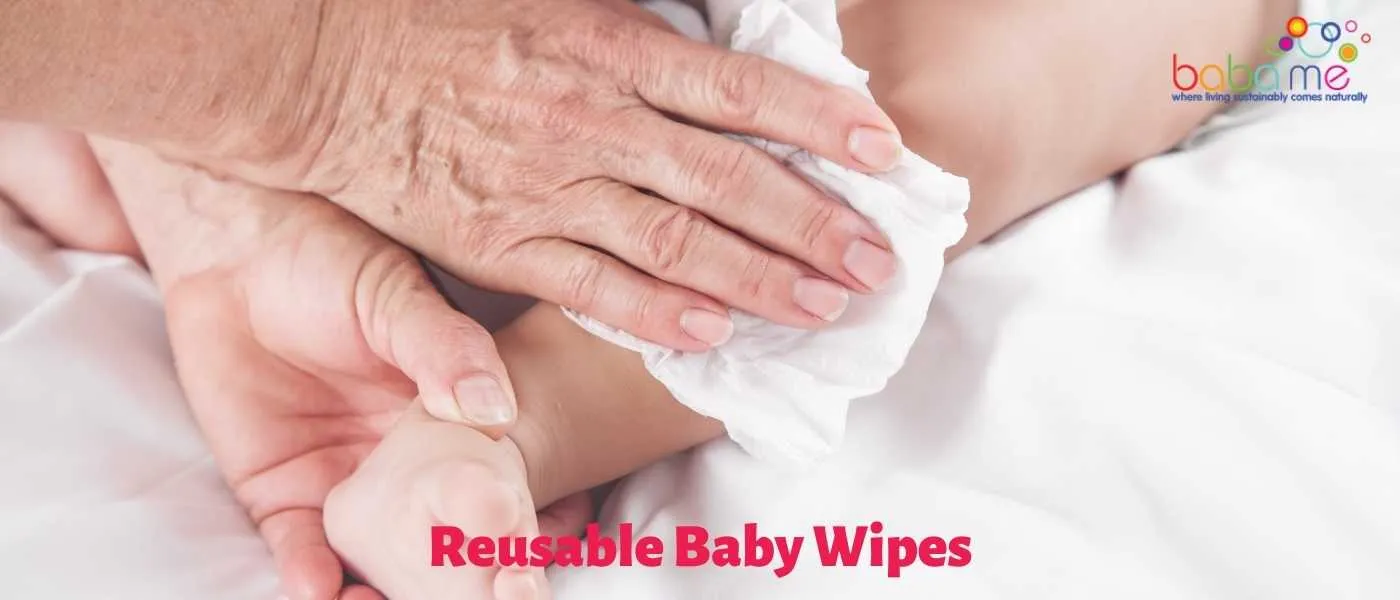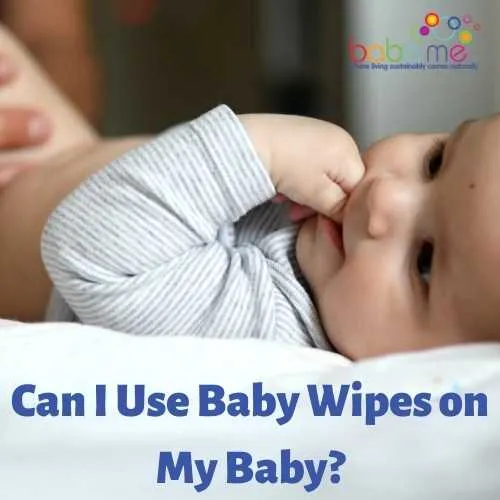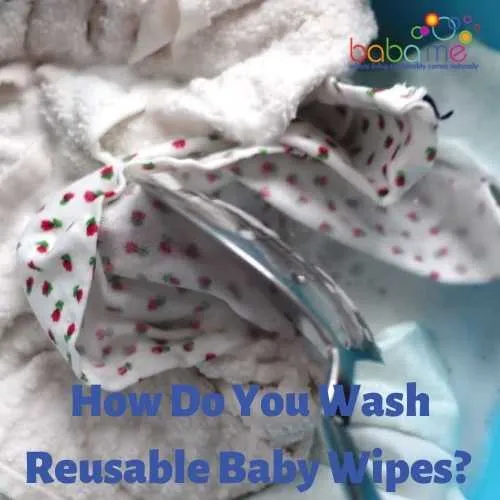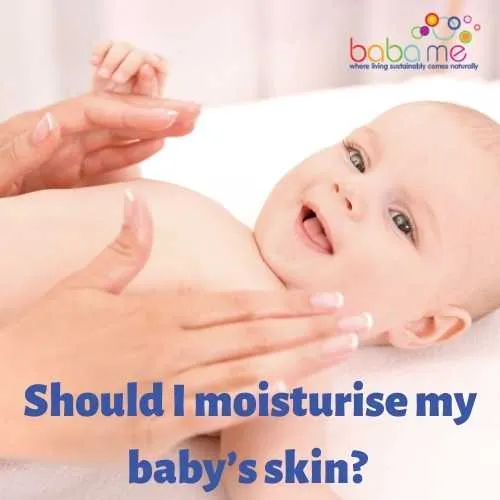Making the decision to switch from disposable wipes to reusable baby wipes is better for your baby, the planet and your wallet. Not only are washable baby wipes made from natural materials that can be washed and reused over and over again, but cloth wipes will save you money and are kinder to baby bottoms, hands & faces than disposable baby wipes.
Reusable wipes can be used for a newborn baby’s very first nappy until potty training and beyond. They are perfect for little hands & faces, great for health and protecting babies from chemicals that may contribute to nappy rash, and reusable cloth wipes are also super handy for cleaning up spills so they can replace paper towels as well as wet wipes.
As soon as you become a parent, baby wipes become a huge part of your everyday life for years. Most parents reach for the baby wipe packet at playtime and mealtimes. Not to mention the baby wipe mountain needed for nappy changes.
Disposable baby wipes are made from plastic, and we have all seen the fatbergs they contribute heavily towards.
Most babies seem to require a constant supply of baby wipes. But if you are conscious of the cost and environmental impact, not to mention the list of chemicals that can be in some of these baby wipes, then you might be looking for an alternative.
Switching to reusable baby wipes is one of the easiest eco-friendly decisions you can make. Using them is easy and convenient, will save you money, and will reduce your plastic waste, all while cleaning your baby’s bottom in the most gentle way possible. And because they are made of natural materials these wipes never need to end up in the landfill.
Our reusable baby wipes are made from natural materials and can be used alongside cloth or disposable nappies. Perfect for a baby’s very first nappy until potty training and beyond.
They are perfect for little hands and faces, great for health, and protect babies from chemicals that may contribute to nappy rash, and reusable cloth wipes are also super handy for cleaning up spills so they can replace paper towels as well as wet wipes.
Why use reusable baby wipes?
Reusable baby wipes offer natural and cost-effective alternatives:
- They are easy to wash and can be used straight from the machine.
- You need fewer baby wipes per nappy change as they clean more effectively.
- They are perfect for cleaning grubby hands and faces.
- You can easily take them with you in a small wet bag.
- Reusable wipes contain no chemicals or fragrances which is ideal for delicate skin. You can even add a few drops of natural essential oil which can actually aid skin healing rather than damaging it.
Reusable baby wipes are made from a wide range of eco-friendly materials but 2 of the most common materials are cotton and bamboo.
Little Lamb bamboo baby wipes are made from a double layer of soft bamboo viscose and rayon. They can be washed alongside reusable cloth nappies and although they are quick drying can also be used wet straight from the machine, just pop them in a wet bag or tub.
Bamboo is generally softer and more absorbent than cotton but the fibers are shorter meaning it isn’t quite so durable. But don’t worry these baby wipes will still last a long time, you’ll save money and save thousands of disposable baby wipes from ending up in landfill or worse our oceans.
Baby Wipes Kit
Building a good baby wipes kit will make using baby wipes easier meaning you can save money and do your bit for the planet with minimal hassle.
If you are using reusable wipes at home alongside either washable cloth nappies or disposables, you’ll probably want a couple of tubs or wet bags. One to keep clean baby wipes moist and one to keep dirty baby wipes contained until it’s time to wash them.
Although most of the time reusable wipes work perfectly with just water, many parents also add essential oils to keep their baby wipes fresh and smelling lovely. A couple of drops of lavender essential oil are perfect for clean baby wipes as it is gentle on the baby’s skin and has natural antiseptic, anti-fungal, and healing properties.
And a drop of chamomile essential oil can also be very soothing if a baby has a sore bum. Tea tree essential oil is antibacterial and antifungal making it perfect for keeping dirty baby wipes fresh until they get washed.
Although there are lots of amazing-smelling essential oils available make sure you check they are safe for babies and always dilute according to instructions.
Simple Guide to Using Reusable Wipes
Reusable wipes can be used for many activities, from using them as baby wipes to makeup wipes and much more.
Many parents consider using reusable baby wipes when they start using cloth nappies. It makes sense, if you are using reusable nappies and washing them, it’s a natural progression to using reusable wipes. If not, you end up with having your nappy in your nappy bucket or bag, then left with disposable baby wipes in your kitchen bin.
When advising parents on using cloth nappies, I always tell them that they might as well use reusable baby wipes. It might not be something they have considered but they do go hand in hand with nappy use. In the parents initial mindset, baby wipes are disposable and should be thrown away. But once you consider the benefits of using nappies, then using wipes is just the next logical step.
There are different types of reusable baby wipes, some are just terry flannel, some have fleecy sides, some have cotton jersey sides. All have their benefits and advantages and sometimes it just comes down to having pretty patterns which you like.
Size is important. Personally I prefer bigger baby wipes which you can completely cover your hand with. Some are quite small and whilst they might be good for some jobs, I just like a good large square!
How to use
There are two methods to using reusable wipes. You can either dry store and wet when needed, or have them soaking ready to go. There are pros and advantages to either method and it really is a personal choice.
If you are using the dry store method, then simply store your wipes in a suitable bag or container. Anything really will do. When you go to change your baby (or clean their hands or face or whatever), then either wet the wipe with lukewarm water under a tap, or use a spray bottle and spray either the bum or the wipe or both!
Wet Soaking Wipes
This involves having your wipes wet and ready to go. Use a suitable container like a lunch box and put in a tiny amount of water and some cleaning agent. For the agent you can really use anything you prefer. Alternatively you can use something like chamomile tea which is very soothing on a baby’s bum. Then put your wipes (enough for 1 day) in the solution, and voila wet wipes ready to go. Every day you should make up a fresh batch of wipes & solution as unless you use preservatives, it will go stale and off.
Avoid using oils in the mixture you make up if you are washing your reusable baby wipes with nappies. Oils can cause repelling issues on nappies.
Small Wet Bags for Wipes
Small wet bags are the natural partner of wipes. You can store your dry or wet wipes in them and have them handy for when you are out and about as it might not be always handy to bring a lunch box full of wipes with you, and you might not have access to running water. Again, with any soiled wipes, just throw them in with your dirty nappies to be washed.
Are Cloth Baby Wipes Cheaper Than Disposables?
Aside from being eco-friendly and really good for sensitive skin and eczema, they’ll also save you a lot of money that has got to be a great combination.
So what are the costs?
One point to note with washable wipes is that you don’t have to do separate loads of washing for them. You can, of course, wash them with your cloth nappies, but mine usually go in with my clothes wash each morning.
A washable wipes kit for cloth nappy users costs about £25. That’s for 25 wipes, a box for soaking your wipes with the essential oil and water, an out and about travel bag and a bottle of essential oil which will last about 6 months.
You might want to add extra wipes when you start weaning (about £10) and you’ll also need more oil over the 2.5 years you will be using bum wipes. So your total cost for wipes for two years will be:
Kit = £25
Extra Wipes = £10.00
50ml Oil = £15
Total = £50
Total Cost for cloth wipes £50!
How does that compare to disposable wipes?
Let’s take an average RRP of £2.49 as a starting point. Some premium brands of wipes can cost up to £6.99 a packet and there are obviously supermarket own brands available which are cheaper, however even Pampers RRP is £2.49 a pack.
How many wipes you’ll use is a good question. You tend to use a lot more disposable wipes than cloth wipes as they have a tendency to smear poo around, whereas cloth wipes do the job with less hassle which compares and contrasts disposable wipes vs cloth wipes).
https://googleads.g.doubleclick.net/pagead/ads?client=ca-pub-6044819150233834&output=html&h=280&adk=2279237598&adf=644831672&pi=t.aa~a.2811592219~i.12~rp.4&w=1200&fwrn=4&fwrnh=100&lmt=1669572281&num_ads=1&rafmt=1&armr=3&sem=mc&pwprc=8013509290&ad_type=text_image&format=1200×280&url=https%3A%2F%2Fbabame.com%2Fare-cloth-baby-wipes-cheaper-than-disposables.html&fwr=0&pra=3&rh=200&rw=1360&rpe=1&resp_fmts=3&wgl=1&fa=27&adsid=ChEIgLKMnAYQss2219mhtsOIARI9AKqMKaMnlJmtg0VX2PvofIonklra8TtN_o3aUkdEXcgDV8bXVRJkfIYsLd5tPQF_spTnMdyI5F_weONtfQ&uach=WyJXaW5kb3dzIiwiMTAuMC4wIiwieDg2IiwiIiwiMTA3LjAuNTMwNC4xMDgiLFtdLGZhbHNlLG51bGwsIjY0IixbWyJHb29nbGUgQ2hyb21lIiwiMTA3LjAuNTMwNC4xMDgiXSxbIkNocm9taXVtIiwiMTA3LjAuNTMwNC4xMDgiXSxbIk5vdD1BP0JyYW5kIiwiMjQuMC4wLjAiXV0sZmFsc2Vd&dt=1669572281618&bpp=1&bdt=1691&idt=-M&shv=r20221110&mjsv=m202211100101&ptt=9&saldr=aa&abxe=1&cookie=ID%3D213d4fada3ededdb-2204434ad5d5005d%3AT%3D1663051867%3ART%3D1663051867%3AS%3DALNI_MbiLPx-f_Vjeb711FgEVV9hc8wY7w&gpic=UID%3D00000b11766f1683%3AT%3D1665769357%3ART%3D1669559630%3AS%3DALNI_Mb33UUqtgcsum8IhdzPa3CoIOn4Jw&prev_fmts=0x0%2C1200x280&nras=3&correlator=5578112937869&frm=20&pv=1&ga_vid=1267263055.1635868037&ga_sid=1669572280&ga_hid=735614567&ga_fc=1&u_tz=0&u_his=14&u_h=900&u_w=1600&u_ah=860&u_aw=1600&u_cd=24&u_sd=1&dmc=8&adx=192&ady=1197&biw=1583&bih=732&scr_x=0&scr_y=300&eid=44759876%2C44759927%2C44759837%2C44777877%2C42531706%2C44760911%2C44776361%2C31070762%2C31070923%2C44770881%2C21066435&oid=2&pvsid=1281995070901520&tmod=1694392186&uas=0&nvt=1&eae=0&fc=1408&brdim=0%2C0%2C0%2C0%2C1600%2C0%2C1600%2C860%2C1600%2C732&vis=1&rsz=%7C%7Cs%7C&abl=NS&fu=128&bc=31&jar=2022-11-27-17&ifi=3&uci=a!3&btvi=1&fsb=1&xpc=jjKuSsIwO1&p=https%3A//babame.com&dtd=8
Most use about 2 packs a week. Some use more than that, some use less but lets take that as an average. So let’s see what that adds up to over 2 years:
https://googleads.g.doubleclick.net/pagead/ads?client=ca-pub-6044819150233834&output=html&h=280&adk=2279237598&adf=1376355574&pi=t.aa~a.2811592219~i.13~rp.4&w=1200&fwrn=4&fwrnh=100&lmt=1669572281&num_ads=1&rafmt=1&armr=3&sem=mc&pwprc=8013509290&ad_type=text_image&format=1200×280&url=https%3A%2F%2Fbabame.com%2Fare-cloth-baby-wipes-cheaper-than-disposables.html&fwr=0&pra=3&rh=200&rw=1360&rpe=1&resp_fmts=3&wgl=1&fa=27&adsid=ChEIgLKMnAYQss2219mhtsOIARI9AKqMKaMnlJmtg0VX2PvofIonklra8TtN_o3aUkdEXcgDV8bXVRJkfIYsLd5tPQF_spTnMdyI5F_weONtfQ&uach=WyJXaW5kb3dzIiwiMTAuMC4wIiwieDg2IiwiIiwiMTA3LjAuNTMwNC4xMDgiLFtdLGZhbHNlLG51bGwsIjY0IixbWyJHb29nbGUgQ2hyb21lIiwiMTA3LjAuNTMwNC4xMDgiXSxbIkNocm9taXVtIiwiMTA3LjAuNTMwNC4xMDgiXSxbIk5vdD1BP0JyYW5kIiwiMjQuMC4wLjAiXV0sZmFsc2Vd&dt=1669572281618&bpp=1&bdt=1691&idt=1&shv=r20221110&mjsv=m202211100101&ptt=9&saldr=aa&abxe=1&cookie=ID%3D213d4fada3ededdb-2204434ad5d5005d%3AT%3D1663051867%3ART%3D1663051867%3AS%3DALNI_MbiLPx-f_Vjeb711FgEVV9hc8wY7w&gpic=UID%3D00000b11766f1683%3AT%3D1665769357%3ART%3D1669559630%3AS%3DALNI_Mb33UUqtgcsum8IhdzPa3CoIOn4Jw&prev_fmts=0x0%2C1200x280%2C1200x280&nras=4&correlator=5578112937869&frm=20&pv=1&ga_vid=1267263055.1635868037&ga_sid=1669572280&ga_hid=735614567&ga_fc=1&u_tz=0&u_his=14&u_h=900&u_w=1600&u_ah=860&u_aw=1600&u_cd=24&u_sd=1&dmc=8&adx=192&ady=1525&biw=1583&bih=732&scr_x=0&scr_y=300&eid=44759876%2C44759927%2C44759837%2C44777877%2C42531706%2C44760911%2C44776361%2C31070762%2C31070923%2C44770881%2C21066435&oid=2&pvsid=1281995070901520&tmod=1694392186&uas=0&nvt=1&eae=0&fc=1408&brdim=0%2C0%2C0%2C0%2C1600%2C0%2C1600%2C860%2C1600%2C732&vis=1&rsz=%7C%7Cs%7C&abl=NS&fu=128&bc=31&jar=2022-11-27-17&ifi=4&uci=a!4&btvi=2&fsb=1&xpc=SwKy0aNveY&p=https%3A//babame.com&dtd=16
Weekly cost of wipes = £2.49 x 2 = £4.98
Yearly Cost of wipes = £4.98 x 52 = £258.96
x 2.5 years = £258.96 x 2 = £647
Even if you buy your wipes on a Buy-one, get one free offer, EVERY week, that’s still £323 on disposable baby wipes, £280 more than you’ll spend on cloth wipes.
Cloth baby wipes will save you at least £280 and make sense financially, so make sure that they’re on your baby shopping list!
What about the washing?
Well simply throw in with your reusable nappies if you are using cloth nappies. I always recommend a pre wash first to rinse off, then a full wash. Line dry for even more savings but most wipes can be put in the tumble dryer, it won’t harm them.







